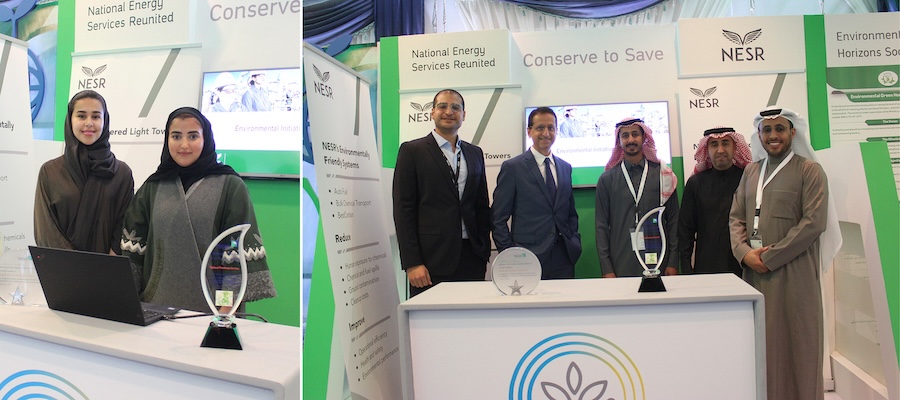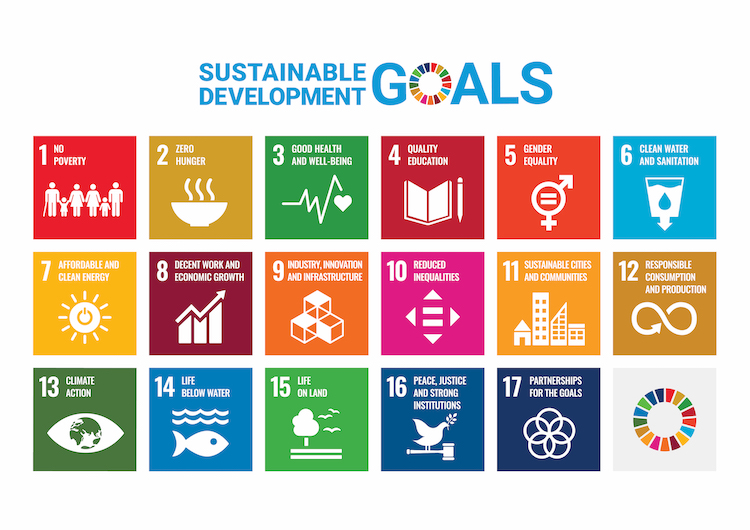NESR is committed to providing technologies & services that
enhance our customers' performance by helping them reduce their
environmental impact and lower the carbon intensity of their
operations. We are dedicated to maintaining a sustainable and
socially responsible company and strive to reduce our environmental
footprint everywhere we operate, both internally in our operations
and externally in the products & services that we provide.
We align our strategies and programs with the United Nations
Sustainable Development Goals and strive to preserve our planet
for future generations, while complying with all relevant rules
and regulations. We firmly believe that our sustainability is
closely linked to the long-term viability of the economies,
environments, and communities in which we live and work. We deploy
innovation ingenuity in our approach. From implementing hybrid
solar power production in our UAE operations, to utilizing an
artifical intelligence (AI) platform for continuous methane
emissions monitoring across our clients’ assets, we are
reducing air emissions and playing a vital role in the sustainable
development of the countries in which we operate.
Climate Change
We recognize the effects of climate change on our planet and our
business and align our approach with the United Nations Sustainable
Development Goals. We are focused on reducing our environmental
footprint and mitigating climate change risks to our business while
continuing to help our customers provide the world access to
affordable, efficient, and reliable energy. When assessing our risk
exposure, we consider risks associated with climate change and their
impact on our business in the near and long-term.
We manage our environmental impact by:
-
Measuring and tracking our environmental performance data
-
Improving annually the measurement and management of our
carbon footprint
-
Enhancing our energy and water efficiency
-
Managing our consumption of natural resources and our
waste
-
Collaborating with our customers to engineer solutions
which
maximize the sustainable value of their assets and reduce
the
environmental impact of their operations
-
Using technologies that help our customers increase their
operational performance while reducing or avoiding
emissions
-
Working with suppliers to reduce the environmental
impacts of
their operations and the greenhouse gas (GHG) emissions
of
their products
-
Ensuring compliance with all applicable environmental
laws and
regulations in the places we operate
-
Reporting regularly on our progress toward effective
sustainability and stewardship of our business and the
advancement of these goals.
NESR is currently mapping out a plan to achieve net zero carbon
emissions from our operations by 2050 and developing new solutions
to enhance our commitments and increase the transparency of our
GHG reporting. Our plans will be announced as soon as reasonably
practicable.
Air Emissions
NESR strives to mitigate environmental impacts associated with GHG
emissions through managing the carbon emissions of our own
operations. All NESR locations with the potential for air emissions
are establishing a documented air emission plan in order to minimize
air emissions.
In 2023, NESR deployed a cutting-edge, artificial intelligence
(AI) based platform for continuous methane & GHG monitoring
and leak detection, across multiple NESR locations and
commercially with several key clients. Properly measuring
emissions and identifying non-routine emissions events (e.g.
facility leaks) is the first step to properly advancing toward Net
Zero Emissions (NZE) in any industry. NESR will continue to
leverage leading technologies to enhance not only its internal
emissions measurement, but also externally across client
operations & assets.
|
Metric
|
Units
|
2020
|
2021
|
2022
|
2023
|
|
CO
2
e - Scope 1
|
metric tons
|
118,854
|
149,035
|
143,484
|
180,019
|
|
CO
2
e - Scope 2
|
metric tons
|
2,420
|
2,253
|
2,378
|
2,244
|
Read More
Read Less
Energy Management
NESR aligns with and supports the United Nations Sustainable
Development Goals of providing access to affordable, reliable,
sustainable, and modern energy for all and taking urgent action to
combat climate change and its impacts.
Implementing responsible energy consumption practices across the
business continues to be included in our environmental objectives.
In 2019, we started tracking our total energy consumption from
different sources with the goal of improving energy efficiency and
increasing the percentage of energy we consume from renewable
sources.
As an example of putting this strategy to action, in 2023 we
inaugurated NESR’s Oilfield Research and Innovation Center
(NORI) in Dhahran Techno Valley, and during the design phase
conducted energy modelling to reduce energy consumption. NORI now
complies with Leadership in Energy and Environmental Design (LEED)
certification requirements and is projected to consume 20% less
energy than comparable buildings in Saudi Arabia. We estimate
that, over time, approximately 5% of the energy consumed at NORI
will be generated from renewable energy sources.
|
Metric
|
Units
|
2020
|
2021
|
2022
|
2023
|
|
Electricity Use
|
MWh
|
6,240
|
25,467
|
5,711
|
5,447
|
Read More
Read Less
Water Management
Water is one of the world’s most valuable resources and we
operate in water stressed areas in the MENA region. We apply best
practices and technological solutions to water management challenges
to reduce the impact of our operations on water resources everywhere
we operate.
NESR also strives to help customers improve the water stewardship
of the broader energy industry, through a growing portfolio of
oilfield water treatment technology partnerships. In 2023, NESR
commissioned its “Carbon-Lite” brine production
facility in Iraq, which leverages a HIROX/CIF technology to unlock
the production of oilfield brine from unusable brackish water,
rather than through the conventional mixing of freshwater &
salt. Not only does this plant drastically reduce both freshwater
consumption and brine production waste, but the concept also
eliminates vast amounts of trucking of raw materials, improving
the safety and emissions intensity of operations.
NESR operations are mainly conducted in water-stressed areas;
therefore, in order to reduce our water consumption substantially,
in 2021 we were the first company in our sector to announce
specific Key Performance Indicator (KPI) targets tied to our
Sustainability-Linked-Loan (SLL) facility, the progress toward
which is presented in the table below .
|
Metric
|
Units
|
2020
|
2021
|
2022
|
2023
|
|
Water used
|
m
3
|
157,459
|
175,332
|
225,887
|
234,963
|
|
Water recycled
|
m
3
|
17,574
|
19,639
|
40,606
|
21,507
|
|
Water recycled
|
percentage
|
11.16
|
11.2
|
17.97
|
9.2
|
Read More
Read Less
Waste Management
We are committed to reducing the environmental impact of our
activities across the entire value chain. We continuously strive to
improve our environmental performance in multiple ways, including
responsible waste management.
To manage waste materials more efficiently, we reuse materials
when possible, recycle both in our own operations and for our
customers, and use innovative technologies to find new recovery
methods. We continue to seek opportunities to reduce both our
direct consumption of resources and the waste we generate. In
addition, NESR audits waste service providers to ensure
appropriate waste treatment and disposal practices are followed.
In 2019, we started tracking the total volume of hazardous and
non-hazardous waste produced by our operations – a first
step toward understanding the volume and nature of the waste we
generate. In an effort to raise employee awareness about the
importance of reducing consumption, reusing what can be reused,
and ultimately reducing and recycling waste, we banned all plastic
water bottles from our offices in 2019 and provided reusable,
environmentally-friendly bottles and cups. In 2020, we started
tracking the volume of waste we recycle, and where our waste
ultimately ends up (incinerated, sent to landfills, sold as scrap,
etc.) This will allow us to understand the full impact of the
waste we generate on different ecosystems. Ultimately, we believe
that the information we are collecting in 2020 will facilitate
better waste management in the future.
|
Metric
|
Units
|
2020
|
2021
|
2022
|
2023
|
|
Hazardous waste generated
|
metric tons
|
5,745
|
10,488
|
25,268
|
19,366
|
|
Non-hazardous waste generated
|
metric tons
|
70,097
|
94,653
|
65,138
|
85,877
|
Read More
Read Less
Environmental Releases
Releases and the potential associated impact to the environment have
our full attention. Each NESR site is equipped with appropriate
emergency control and spill prevention plans.
|
Metric
|
Units
|
2020
|
2021
|
2022
|
2023
|
|
Spills > 1 bbl
|
barrels
|
ND
|
2
|
6
|
4
|
|
Volume of spills
|
liters
|
ND
|
ND
|
3920
|
2500
|
As part of NESR’s process safety procedures, barriers as
part of well integrity are crucial to reducing the risk of the
uncontrolled release of formation fluids. NESR has a portfolio of
cementing technologies and logging tools for ensuring and
evaluating well integrity. Zonal isolation is created and
maintained in the wellbore through the cementing process. Cement
supports and protects well casings and helps prevent fluids in one
zone from mixing with fluids in another zone. The cement systems
help establish zonal isolation work in a variety of reservoir
conditions and remain in place throughout the life of the well.
To prevent unplanned discharges, NESR tests the integrity of
service equipment on a regular basis. Regularly scheduled
inspections, evaluations, and testing of bulk storage containers
by qualified personnel are critical parts of discharge prevention.
Our inspection and testing programs involve an external visual
inspection along with extensive testing and examination to
evaluate container integrity. These inspections are site specific
and they meet or exceed industry standards.
NESR has deployed an automatic fuel system in its fracturing
operations which consists of a closed system that supplies diesel
to the fracturing fleet. This system can fuel all the equipment in
a large fleet simultaneously, eliminating spills, hazards for the
fracturing crew, and overfill risk. In addition to the
environmental impact, the automatic fuel system improves the
efficiency of the fracturing operation and reduces nonproductive
time.
NESR also establishes secondary containment as part of protection
measures for primary storage.
Read More
Read Less
Chemical Transparency
During the design and development phase of fracturing, all chemical
additives are selected based on minimum environmental impact and
regulatory acceptance in the operating companies and countries where
we operate. In addition, these chemical formulations are designed to
be safe for the individuals who are handling them, from the
manufacturing plant to the final oilfield application. Our current
fracturing fluids are developed by one of our US-based technology
partners, and as such, these additives are publicly disclosed via
FracFocus when deployed in the US market by our partner.
|
Metric
|
Units
|
2020
|
2021
|
2022
|
2023
|
|
Volume of Hydraulic Fracturing Fluid Used
|
m3
|
1,743,769
|
1,525,003
|
1,446,145
|
2,211,509
|
|
Percent of Hydraulic Fracturing Fluid Used
(Down Well)
|
percentage
|
0.45
|
0.35
|
0.35
|
0.28
|
Read More
Read Less
Environmental Compliance
NESR’s operations are conducted in compliance with industry
standard certification programs, including those for quality
management (ISO 9001), environmental management (ISO 14001), and
health and safety management (ISO 45001 or OHSAS 18001). The NESR
integrated HSE management system is aligned with ISO
9001/14001/45001.
We communicate our HSE philosophy to all employees, customers,
contractors, and third parties associated with our business, and
each NESR organization is required to provide evidence of
conformance to the relevant system.
Most of our operating countries are ISO 14001 certified by
external certification bodies. In addition, those entities
frequently hold multiple other certifications, such as ISO
9001/45001, OSHAS 18001, and API Q1 and Q2. No environmental
violations have been recorded across NESR’s operations in
2019 and throughout the first half of 2020.
Environmental Achievements
Our environmental achievements this year are broad ranging.
As a company, NESR has:
-
Implemented a solar-diesel-hybrid (SDH) power system with
~104kWp solar capacity at the NESR Habshan Basecamp,
Includes
a nearly 10% green electricity mix, saving nearly 150 MT
CO2e
emissions by offsetting diesel consumption, with plans to
increase green energy usage and reduce CO2e in the future
-
Saudi Aramco and NESR achieved groundbreaking results
with
DyVaR desalination technology, converting high TDS
produced
GOSP water to freshwater (avg < 100 ppm TDS) with
remarkable water recovery (~80%). This innovative
approach
also enabled salt recovery (NaCl) with over 99% purity,
suitable for medical-grade applications.
-
The 'Carbon-Lite' HIROX process is a significant
breakthrough,
producing 4,000+ bpd of at-spec brine for local energy
operations while significantly reducing waste and
freshwater
use compared to conventional methods, revolutionizing the
brine supply chain in Iraq's water-scarce region
-
Been selected by Aramco to participate in the 2019
Southern
Area Oil Operations (SAOO) Environmental Campaign;
-
Participated in an environmental campaign in Saudi Arabia
to
spread awareness on best environmental practices among
school
children;
-
Been recognized by Saudi Aramco’s Southern Area
Well
Completion Operations Department (SAWCOD) for its
outstanding
contributions towards the accomplishment of environmental
initiatives in 2019;
-
Installed energy-efficient lighting, heating, and cooling
systems;
-
Prioritized technological developments aimed at
minimizing CO
2
emissions;
-
Replaced diesel-powered light towers in rigless sites in
Saudi
Arabia with solar power light towers to reduce noise
pollution, fuel consumption and CO
2
emissions;
-
Banned plastic water bottles in NESR offices to reduce
waste;
-
Reduced 6700 m
3
of fresh water per year in Oman operations by changing
the
cement slurry formula;
-
Educated employees about greener operational alternatives
and
practices and encouraged them to adopt initiatives that
support the achievement of our annual targets;
-
Advanced the operational processes in our facilities by
taking
significant steps to reduce scrap and the use of harmful
chemicals;
-
Worked closely with community and nonprofit organizations
to
develop initiatives to apply technology, expertise, and
volunteerism toward solving pressing environmental
issues;
-
Conducted assessments of business partners, suppliers,
and
contractors to uphold equal social and environmental
standards, and defined next steps to improve
worker-management, communication and working conditions.






